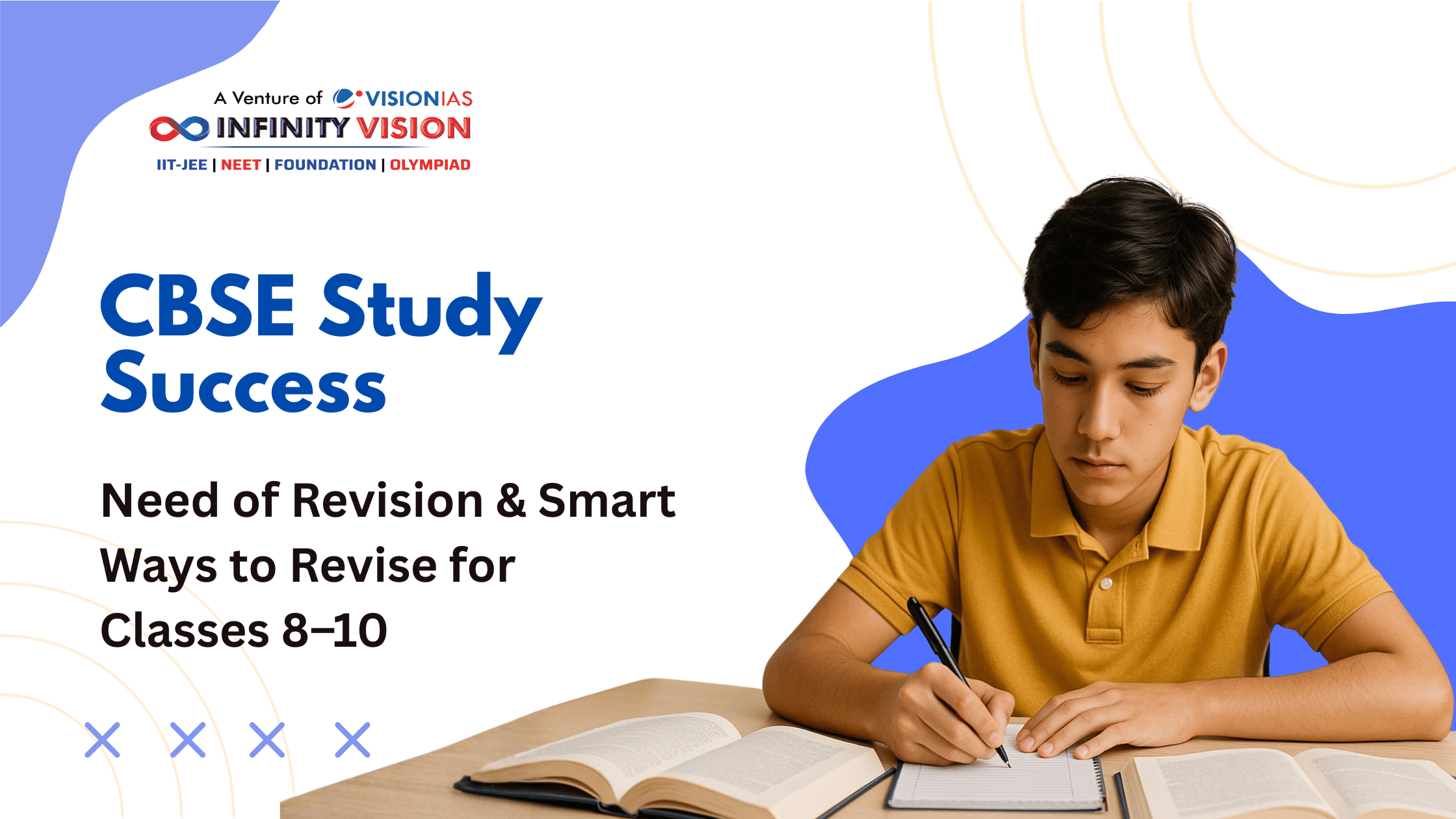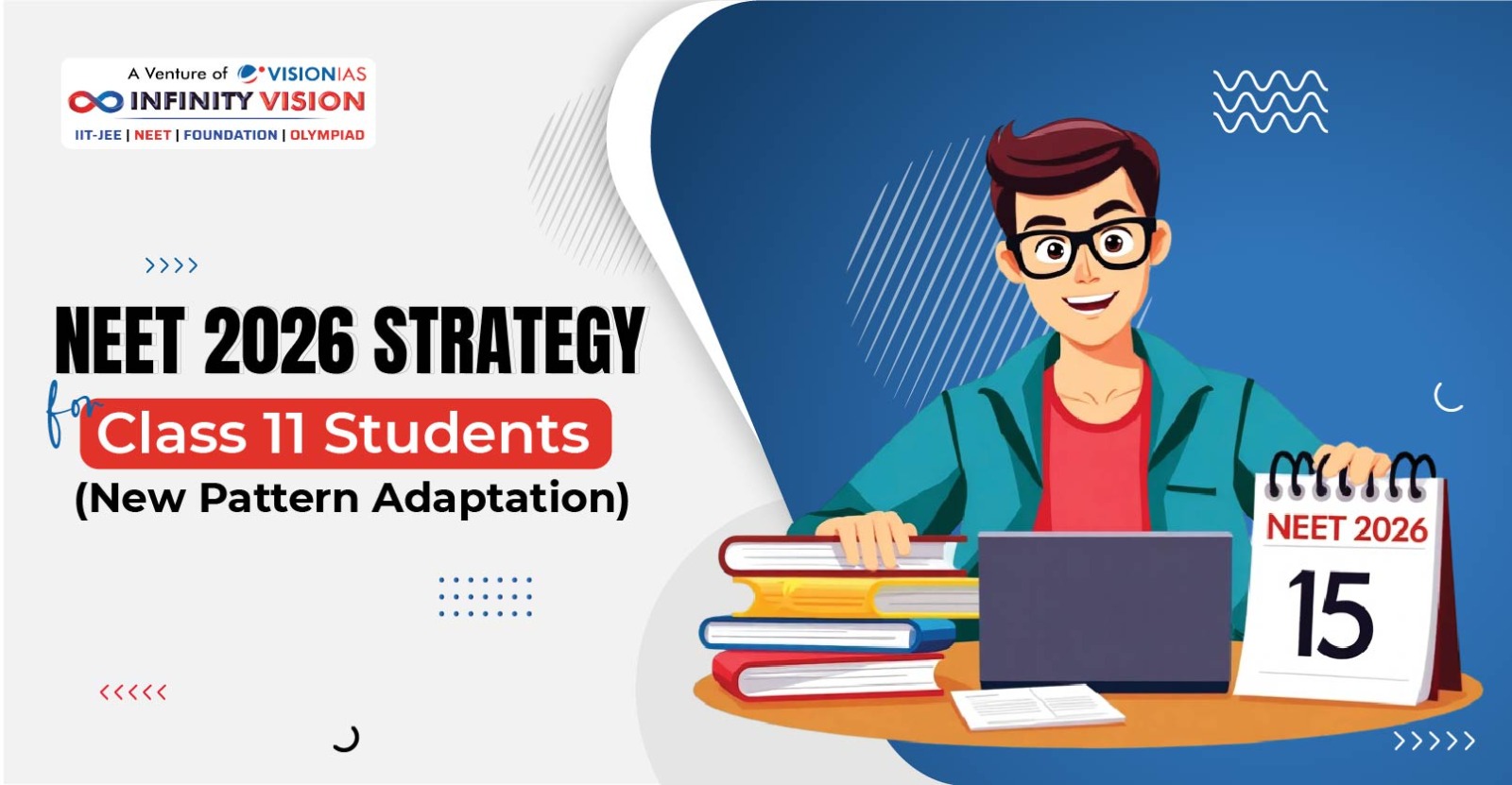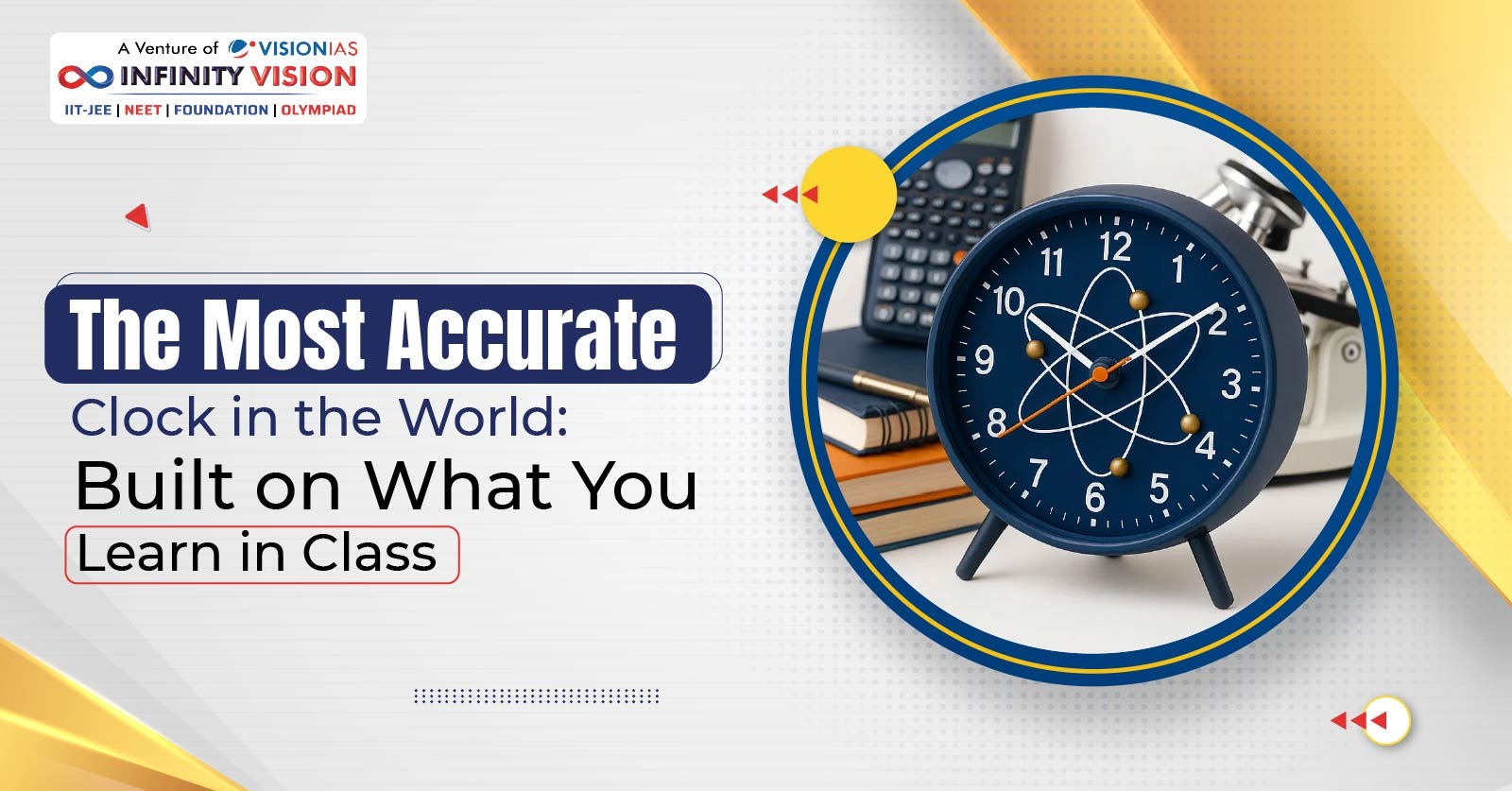Understanding the New NEET 2026 Pattern
The NTA has confirmed that NEET 2026 will follow the pre-COVID format introduced in 2025. In January 2025, it was announced that the optional Section B has been discontinued – all 180 questions are now compulsory (45 each in Physics and Chemistry, 90 in Biology) and must be solved within 180 minutes. That is why it becomes important to follow a comprehensive NEET 2026 strategy for class 11 students, especially to achieve a satisfactory score. The NEET syllabus was rationalized by the NMC in 2024 (streamlining topics) and is expected to remain unchanged for 2025–26. Importantly, the syllabus is fully based on the NCERT Class 11 and 12 content. Students should note that every topic counts in the new pattern, so a strong foundation across all subjects is essential.
Implications for Class 11 Aspirants
Starting in Class 11 gives you the advantage of time to build a deep understanding. First, thoroughly review the NEET 2026 syllabus and exam structure so you know what to expect. Then plan your NEET 2026 strategy for class 11 and 12 by dividing time between school and NEET prep. In fact, even if you attend a regular school, divide your time accordingly to balance both school studies and NEET preparation. Use your NCERT textbooks as the main material and avoid collecting too many reference books early on. Join a good coaching program or online test series if possible, and start making concise revision notes on each chapter. Identify your strengths and weaknesses in Physics, Chemistry, and Biology, and allocate more practice to weaker topics. Remember, consistent daily study is key.
Subject-wise Preparation NEET 2026 strategy for class 11
While there may be some overlap and similarities in the syllabi of the three core subjects, it’s important to understand that each subject is unique and demands individual attention. For instance, Biology involves extensive memorisation, whereas Physics requires mathematical reasoning and a strong conceptual understanding.
- Physics: Build strong concepts first. For Class 11, cover basics like Units & Measurements, Motion, and Newton’s laws, then progress to Thermodynamics and Waves. Focus on high-weight topics (mechanics, thermo) early. Study each concept from NCERT, then reinforce by solving problems (from books like H.C. Verma) and past NEET questions. Keep a formula sheet for quick revision. As you advance, include Class 12 topics (electrostatics, optics).
- Chemistry: Tackle Physical, Organic, and Inorganic chemistry in parallel. Start Class 11 topics: Mole Concept, Atomic Structure, Periodic Table, and Chemical Bonding. In Physical Chemistry, practice numerical problems (e.g, from O.P. Tandon) to build speed. In Organic Chemistry, focus on the fundamentals of bonding and simple reactions; make flashcards of important reactions. In Inorganic Chemistry, learn periodic trends and group properties thoroughly (Concise Inorganic Chemistry by J.D. Lee is a good supplement). Coaches recommend mastering organic reactions and periodic trends and then sharpening skills with numericals. Practice MCQs regularly to improve accuracy.
- Biology: NCERT is the backbone for Biology. In Class 11, concentrate on Cell Biology, Plant and Animal Physiology, Genetics, and Ecology. Since Biology is heavy on memory, draw and label diagrams (e.g., cycles, anatomy) and use charts or flow diagrams to link concepts. Key topics like Human Physiology, Reproduction, and Genetics carry more weight, so revise them often. Weekly review previous topics to retain details. Use mnemonic aids for processes (like photosynthesis steps) and practice previous NEET Biology MCQs to get used to the question style.
Study Planner (Weekly/Monthly) for Beginners
Starting in Class 11, plan long-term. A sample plan could be:
- Months 1–2: Cover Class 11 NCERT basics. For example, dedicate Week 1 to Physics (measurement, motion), Week 2 to Chemistry (basic concepts, atomic structure), Week 3 to Biology (cell structure, plant tissues), and Week 4 to revision. Aim for ~15–20 study hours per week, mixing theory and practice problems.
- Months 3–5: Complete remaining Class 11 topics. Begin introducing Class 12 fundamentals lightly. For instance, add one Class 12 chapter per week (e.g., Electrostatics in Physics, Organic basics in Chemistry) while revising Class 11 topics each week. Take one short mock test at the end of each month to check progress.
- Months 6–8: Finish Class 12 NCERT coverage. By now, increase problem-solving: solve more chapter-wise tests and past papers. Spend weekends on revision sessions of earlier topics. Join the test series of Infinity Vision.
- Months 9–10: Full revision phase. Revise all topics and focus on weak areas identified in tests. Increase mock tests: start with 1–2 full-length NEET mocks per week and practice time management.
- Month 11 (Final stretch): Simulate exam conditions: take a mock test almost daily. Analyze mistakes immediately and review those chapters. Keep revising short notes and formulas daily.
A weekly schedule might look like: 2–3 hours per day on weekdays (one subject per slot) and longer study sessions on weekends. For example: Monday (Physics + numerical practice), Tuesday (Chemistry theory + MCQs), Wednesday (Biology reading + diagrams), Thursday (Chemistry problems), Friday (Physics numerical problems), Saturday (Mock test & analysis), Sunday (Revision & weak-topic review). Adjust this based on your personal peak concentration times.
Suggested Weekly Study Plan for Class 11 NEET 2026 Aspirants
This sample table helps Class 11 students plan their weekly NEET preparation alongside schoolwork. You can customise it as per your school hours and energy levels.
| Day |
Subject Focus |
Topics |
Time Allotted |
Activities |
| Monday |
Physics |
Units & Measurements / Motion in a Straight Line |
2–2.5 hours |
NCERT reading + concept videos + 15 MCQs |
| Tuesday |
Chemistry |
Some Basic Concepts of Chemistry / Atomic Structure |
2 hours |
NCERT reading + numericals + formula notes |
| Wednesday |
Biology |
Cell: Structure and Functions / Biomolecules |
2.5 hours |
NCERT + diagrams + 20 MCQs |
| Thursday |
Physics + Revision |
Laws of Motion + Revise previous Physics topic |
2 hours |
Practice numericals + flashcard review |
| Friday |
Chemistry |
Periodic Table / Chemical Bonding |
2 hours |
Concept mapping + questions from previous years |
| Saturday |
Mixed + Mock Test |
Test (Physics or Bio focus) + Weak Topic Revision |
3–4 hours |
Full-length chapter test + error review |
| Sunday |
Biology + Quick Revision |
Plant Physiology + Review past week’s topics |
3 hours |
Flowcharts + notes + 30 Biology MCQs |
Balancing Board Exams with NEET Prep
Fortunately, the NEET syllabus aligns closely with the CBSE/NCERT board curriculum. Use this overlap: as you study for Class 11 and 12 boards, you’re effectively covering NEET topics too. Rely on NCERT for all science subjects – strong board preparation boosts NEET readiness. During exam season, focus on board studies in daytime and reserve early morning/evening slots for NEET revision. For example, if you have a school subject exam, study that subject’s NEET portion immediately after. While Class 12 students have to appear for Board exams, they should not compromise on NEET preparation. After board exams, devote time fully to NEET mocks and revision. Remember, a well-planned timetable that clearly separates board and NEET study hours will keep stress low and cover all material efficiently.
Recommended Books and Resources
- NCERT Textbooks: The “mother books” for NEET. Read the Class 11 and 12 NCERT books thoroughly first. Many questions in NEET come directly from these.
- Physics References: Once NCERT is clear, use H.C. Verma’s Concepts of Physics and D.C. Pandey’s Objective Physics for extra practice. These strengthen problem-solving skills. Avoid too many theory books; focus on solved exercises.
- Chemistry References: For Physical Chemistry, O.P. Tandon’s Physical Chemistry is highly recommended. For Inorganic, Concise Inorganic Chemistry by J.D. Lee or Modern’s ABC of Chemistry helps with depth. Organic Chemistry practice books or coaching modules can boost confidence in reaction mechanisms.
- Biology References: After NCERT, guidebooks like Trueman’s Objective Biology or Arihant/MTG Guide to NEET Biology provide extra MCQs for practice. They are handy for revision, but don’t skip NCERT facts.
- Coaching Study Material: Institutes like Infinity Vision offer updated NEET modules, test series, and video lectures. Using their practice papers and doubt-clearing sessions can provide structured guidance.
- Online Tools: Use NTA’s sample papers and reliable mock-test platforms. Many apps and websites (including free resources from NTA ) have practice questions and timed tests – use these regularly. Also, consider joining online forums or doubt groups if you need help (just be cautious to stick to quality advice).
Revision and Mock-Test NEET 2026 strategy for class 11
Effective revision is as important as learning new topics. Make concise revision notes or flashcards for formulas, reactions, and key points, and review them weekly. Schedule quick daily reviews of previous topics (even 10–15 minutes) to move information into long-term memory. Closer to the exam, focus on revising rather than learning new content.
Mock tests should ramp up over time. Begin with one full-length NEET mock per week once major topics are covered. These tests help you “assess your strengths and weaknesses” and get familiar with exam timing. As the exam approaches, begin with 1–2 tests weekly… ramping up to daily tests in Months 10–11 for peak performance. After each mock, thoroughly analyze mistakes: revisit those chapters in NCERT and your notes. Also, solve previous years’ NEET papers – they give insight into question patterns. Keep each test’s atmosphere strict (no distractions) to build exam stamina. Over time, this strategy will greatly improve your speed, accuracy, and confidence for the real NEET.
Staying motivated over many months requires discipline and balance. Remember to take short breaks, stay healthy, and be positive. Every day of practice counts. By following a well-structured plan, using trusted books and resources, and regularly testing themselves, Class 11 students can adapt smoothly to the new NEET pattern and aim for top scores in 2026. Good luck on your journey!











